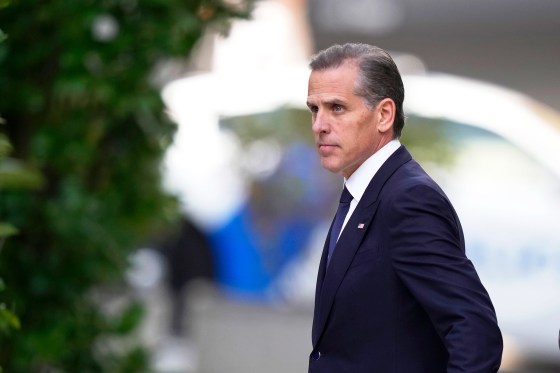

Special counsel David Weiss’ office referred in a filing Wednesday to evidence it intends to introduce at trial purportedly showing that Hunter Biden was compensated by a Romanian businessman who was trying to influence U.S. policy and end a local investigation of him in Romania.
The prosecution will present evidence at trial that the president’s son “received compensation from a foreign principal who was attempting to influence U.S. policy and public opinion and cause the United States to investigate the Romanian investigation” of the businessman, senior assistant special counsel Derek Hines wrote in Wednesday’s filing.
The special counsel's team also intends to target Biden's business dealings even more, saying in the filing that prosecutors intend to introduce evidence at trial pertaining to Biden’s business agreements with the Ukrainian natural gas company Burisma and Chinese-led CEFC China Energy Company.
“The evidence will not include evidence that the defendant performed lobbying activity in exchange for this compensation,” Weiss’ team wrote.
“Rather the evidence will show the defendant performed almost no work in exchange for the millions of dollars he received from these entities,” the filing added.
The prosecution included the additional details about its plans for trial in a filing urging the court to deny Biden’s request to omit certain evidence that his attorneys view as unfairly prejudicial in his federal tax case. He is alleged to have failed to pay taxes, failed to file, evaded an assessment and filed a fraudulent form, and has pleaded not guilty to the charges.
An attorney for Biden did not immediately respond to a request for comment Wednesday night.
Prosecutors previously alleged in their indictment that from November 2015 to May 2017, Biden received a third of roughly $3.1 million in compensation related to an oral agreement to help the businessman, who is referred to as “G.P.” in the filings, to contest bribery charges he was facing in Romania.
Prosecutors said a business associate, who is not named in the filing, would testify at trial about the Romanian businessman’s alleged efforts to retain the associate, Biden, and another associate to try to press federal agencies to open an investigation in an effort to end Romania’s criminal investigation.
Prosecutors do not intend to introduce evidence of "direct compensation from a foreign state or evidence that the defendant received compensation for actions taken by his father that impacted national or international politics," Hines wrote.
He did argue, however, that the pay structure and details about Biden's work were relevant to the case.
"Moreover, the evidence of what the defendant agreed to do and did do for G.P. demonstrates the defendant’s state of mind and intent during the relevant tax years charged in the indictment," Hines wrote.
The fact that Biden was suffering from drug addiction does not mean that he was in a diminished capacity, a legal theory that a person does not have the mental state needed to formulate intent to commit a crime.
"It is also evidence that the defendant’s actions do not reflect someone with a diminished capacity, given that he agreed to attempt to influence U.S. public policy and receive millions of dollars pursuant to an oral agreement" with his associate as part of a plan "that concealed the true nature of the work," he added.
Biden's trial is scheduled begin next month.
Zoë Richards is a politics reporter for NBC News.